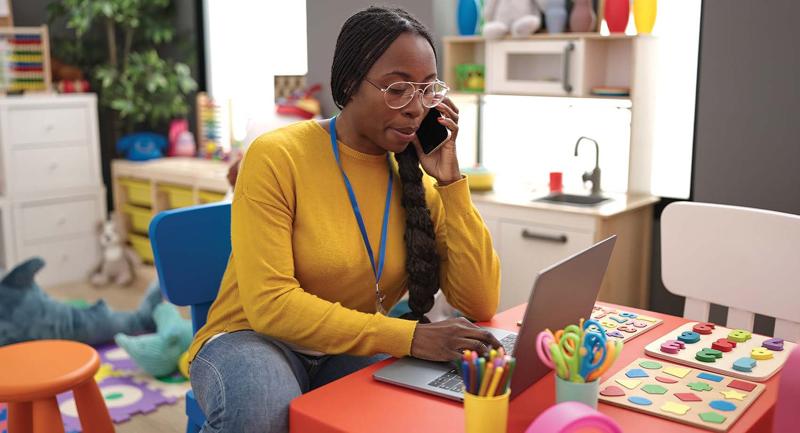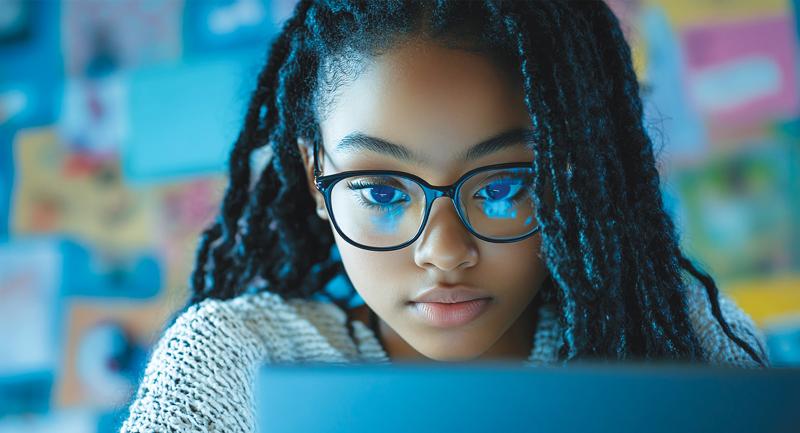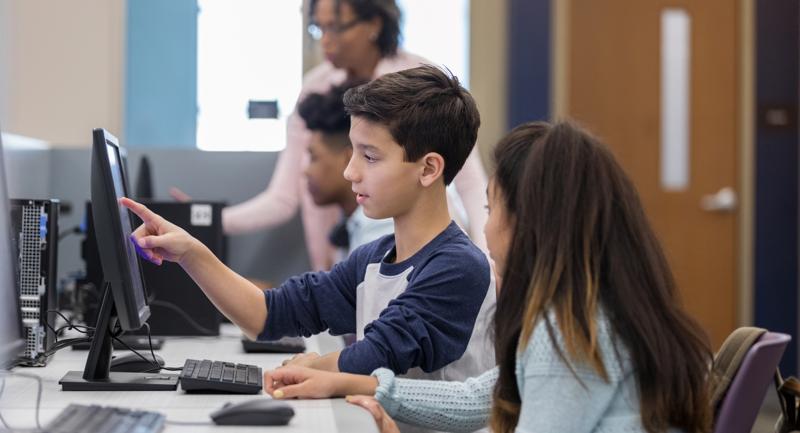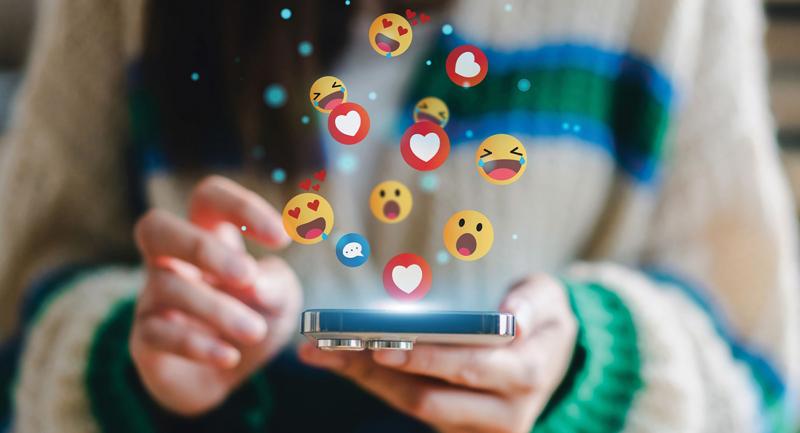June 26, 2023
•
5 min (est.)•
Vol. 80•
No. 9A Rising Priority for Edtech: Relationship Building in Schools
A growing number of tools can be used by educators to support developmental relationships with students, which are key to learning.
Credit: iantfoto / istock
I recently attended a conference where I provided the perspective of a school district leader on a panel otherwise composed of leaders from educational technology companies. During the discussion, I was asked where I thought the edtech sector should focus its efforts in the years ahead. My response didn't focus on developing apps that help students master academic subjects or on software that improves operational efficiency, though I think both of those are good objectives. Instead, I replied that I think the edtech industry should focus on solutions that enable and empower relationships—that take some of the friction out of making human connections to help students succeed within and beyond our schools.
The fact that I was able to say this without being met with complete surprise or disdain is notable. It's useful to remember that in preK–12 education, relationships in schools haven't always been considered a worthy focus of policy or serious investment—or even much discussion. During and after the No Child Left Behind era, educators who wanted to focus on relationships faced major pressure from federal and state policies and local stakeholders to focus on more strictly academic strategies—initiatives narrowly designed to produce gains on standardized tests and improve district and state accountability rankings.
Fast forward to today, however, and the challenge is no longer convincing people that relationships in schools matter. If that debate was not settled before the COVID-19 pandemic, it was conclusively decided by the lived experience of millions of students and teachers who could not connect with each other in person during lengthy quarantines, and by studies that have demonstrated the negative impact distance learning had on students' achievement. The latest results from the National Assessment of Educational Progress, for example, report significant declines in math and reading between 2019 and 2022, losses largely attributed to the disruptions caused by the pandemic. Additionally, the inaugural State of the Student report by the Center on Reinventing Public Education shows widespread harm to student mental health during the pandemic, but also notes that well-being concerns have been on the rise prior to 2020, as have rising levels of student disengagement in classrooms (CRPE, 2022). In this context, it has become increasingly clear that the relational aspects of schooling are not separate from academic achievement.
For many schools, the focus has shifted toward making it possible to build strong relationships with all students amidst the many other challenges and time pressures that educators face. This shift doesn't mean that academics rank lower in our priority focus—nor should they, given the data we are seeing post-pandemic. However, we have begun to recognize in earnest that helping students perform at their best begins with the foundational elements of a positive school culture and strong student-teacher relationships. Somewhat paradoxically, our challenge is to make relationship building more efficient and "at scale" while also maintaining the authenticity of those relationships.
My career trajectory has provided me with a unique understanding of the importance of this problem, as well as the beginnings to some solutions to it. I began my career as a high school social studies teacher in the 1990s, when—like almost every teacher—I learned through experience that the personal connections I made with students had powerful effects on their effort and learning in my class.
Through a somewhat circuitous turn of events, I left the classroom earlier than I planned to and eventually found myself working in the world of research. I worked first at the University of Minnesota and then as president and CEO of Search Institute, an applied research organization that has conducted pioneering studies on the developmental assets and relationships that young people need in order to be and become their best selves.
During the decade I spent at Search Institute, my colleagues and I conducted studies showing that when young people experience what we described as a developmental relationship with teachers, out-of-school-time program staff, and parents and other caregivers, their social-emotional competencies and academic outcomes, including motivation to learn and grades, are significantly stronger (Scales, Pekel, & Houltberg, 2022). Developmental relationships are the close connections through which young people are able to discover who they are, cultivate abilities to shape their own lives, and learn how to engage with and contribute to the world around them. In a longitudinal study of middle and high school students, we also found that when students' experience of developmental relationships increases over the course of the school year, they have better educational outcomes than do students whose relationships with teachers stay about the same or get worse (Scales et al., 2019).
So when I left Search Institute in 2021 to become superintendent of schools in Rochester, Minnesota, I knew that I wanted to make building relationships a major aspect of our district's work. I shared the research that we conducted at Search Institute with teachers, principals, and other educators in the district during the first days of my tenure. Many of my new colleagues found the Developmental Relationships Framework (Search Institute, 2020) that had emerged from the Search Institute's research to be a helpful resource for identifying specific actions—such as making students feel known and valued and guiding students through challenging situations—that can lead to transformative relationships. However, we were still lacking a practical tool to help teachers implement the 20 actions included in the framework amidst the many other responsibilities they have both inside and outside the classroom.
The solution came in the form of technology, which—in the right conditions—can offer new ways to enhance human connection. In our quest to help teachers build better relationships, we began using Along, a conversation-building platform based on the research conducted at Search Institute and findings from other scholars and organizations. Along provides a safe and convenient space for teachers to send regular messages to students that are designed to help teacher and student get to know each other better. Using Along, educators can access research-based reflective questions crafted to help build teacher-student connections in a quick and meaningful manner, and students can respond back through video, audio, or text. Additional classroom lessons and activities within Along further reinforce the connections that are made via the technology.
We piloted Along in Rochester Public Schools during the 2021–2022 school year. The pilot took place over 3 months in a variety of elementary, middle, and high schools in our district. Teachers had the option to try Along by regularly using it to ask their students reflection questions within the platform. The results were promising. We found that after using Along, teachers and students felt more connected with each other, with 83 percent of students saying that Along helped their teacher get to know them and 81 percent of teachers saying that the platform helped them to be more open with their students. As we implement our new strategic plan for the district, we will be focusing on ways to evaluate how relationship building efforts are impacting student learning.
Of course, Along is not the only example of how technology can enable better relationships. At the conference where I participated on the edtech panel, I encountered PowerMyLearning, which reinforces students' skills in math and language arts through engaging play-based activities that create closer connections between students, teachers, and parents and other caregivers. I also met the developer of Short Answer, a free platform that enables students to work together to respond to teachers' questions and provide feedback on each other's responses, in the process strengthening relationships among students in the class. Finally, I met the leader of Intellispark, which enables educators to communicate with each other and with students to personalize students' educational experience in multiple ways.
Many different types of strategies and resources will be required to make building developmental relationships a reality for all students in our schools and classrooms. Some of those strategies will utilize technology; others will be activities and practices that educators can integrate into curriculum and instruction and other school programming. Whatever tools we use, it is time to move beyond talking about the power of relationships to harnessing the power of technology to spark and strengthen the human connections that all young people need to thrive.
References
•
Center for Reinventing Public Education. (2022) The state of the American student: Fall 2022.
•
Scales, P. C., Pekel, K., & Houltberg, B. J. (2022). Developmental relationships and student academic motivation: Current research and future findings. In A.L. Reschly & S.L. Christenson (Ed.), Handbook of Research on Student Engagement (pp. 257–283). Springer.
•
Scales, P. C., Pekel, K., Sethi, J., Chamberlain, R., & Van Boekel, M. (2019). Academic year changes in student-teacher developmental relationships and their linkage to middle and high school students' motivation: A mixed methods study. The Journal of Early Adolescence, 40(4).
•
Search Institute (2020). "Developmental relationships framework."








